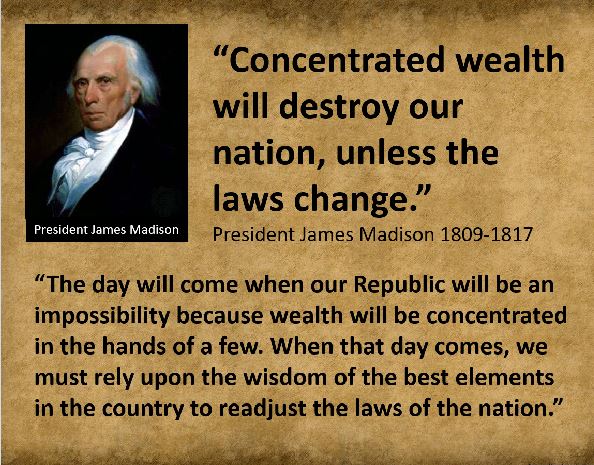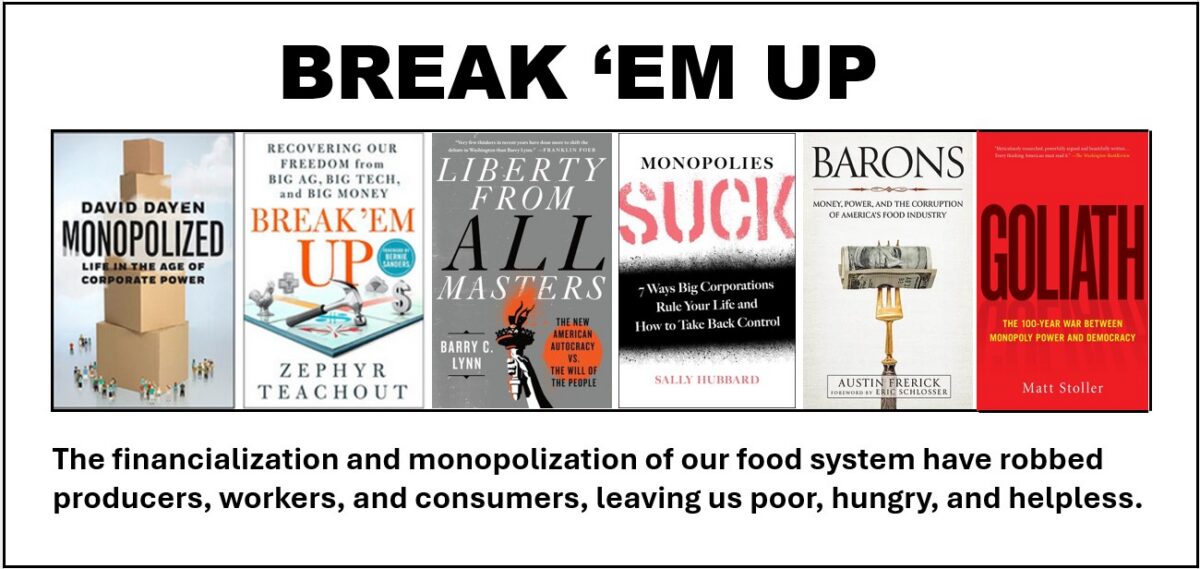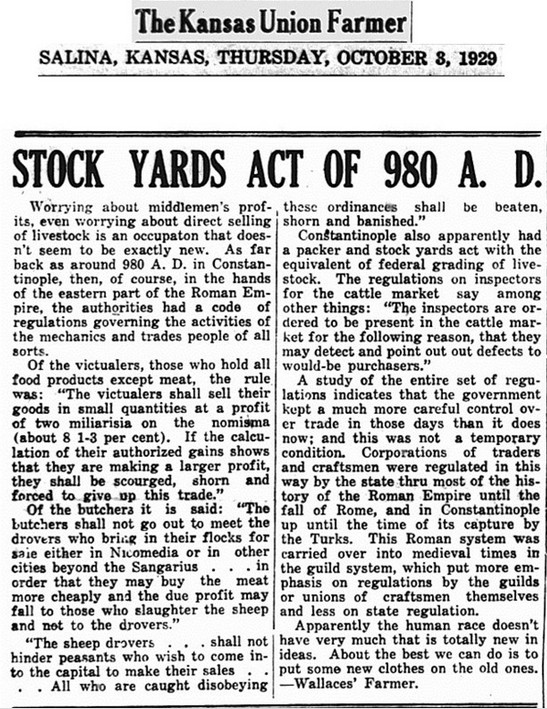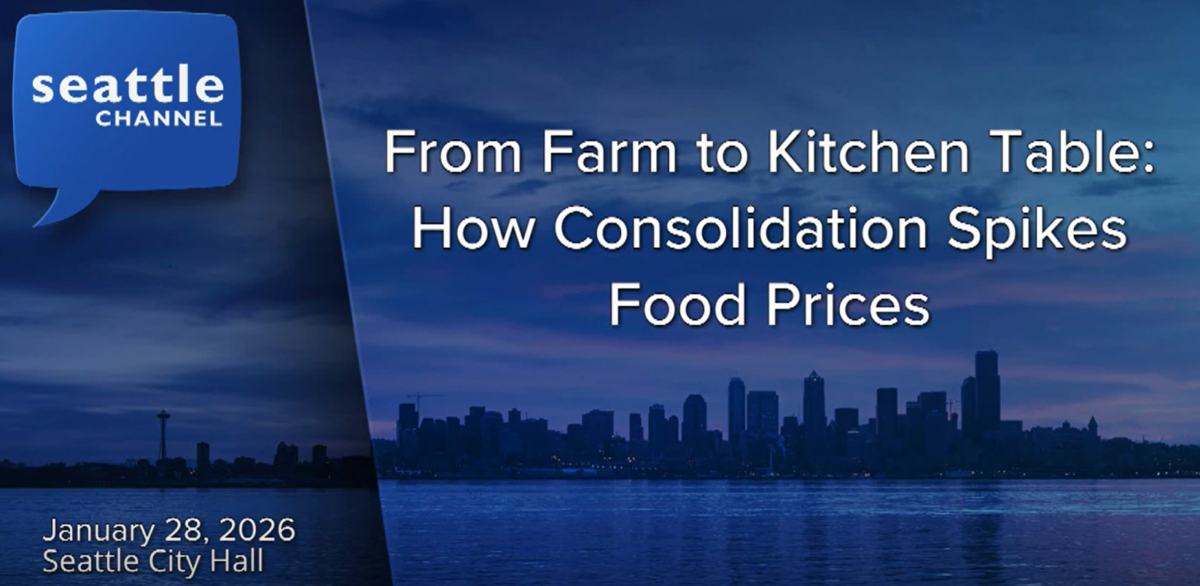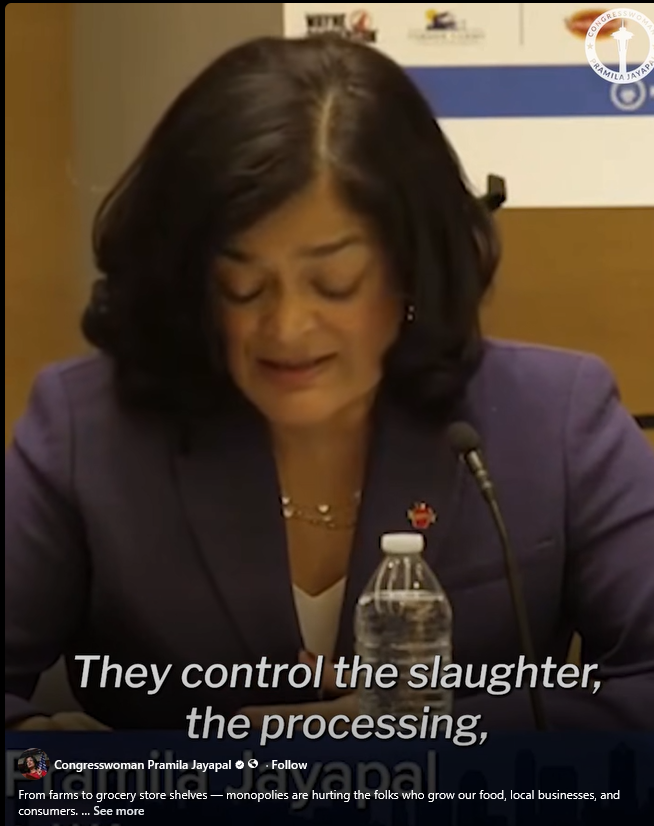“The greatest threat to any free society is the concentration of power and wealth into the hands of a few.” James Madison
Concentration of power and wealth is to free enterprise what cancer is to the human body.
Mike Callicrate Statement:
My name is Mike Callicrate. I’m a cattle and meat producer with operations in Kansas and Colorado. Thank you for the opportunity to present testimony today.
Since I first got in the cattle business in 1972, retail meat prices have become increasingly disconnected from cattle prices, as monopolistic middlemen push producer prices lower and consumer prices higher. The producer’s share of the consumer beef dollar is now around 50 percent, down from around 80 percent in 1970.
What can be done? We must break up the corporate middlemen who are extracting an unfair share of the retail dollar, while denying a fair income to producers and workers. We need to reform USDA’s meat inspection service to make it more workable for small processing plants, invest in local/regional food infrastructure and outlaw government purchasing of meat from large multinational and foreign-owned companies. That business should go to small and midsized slaughter plants, keeping the wealth from agriculture local, creating jobs and revitalizing rural communities.
In 1994, I experienced one of the biggest cattle market crashes in history when IBP, the world’s largest meatpacker, stepped out of the cash market for six weeks, dropping the price of finished cattle over $200 per head, nearly a quarter of their total value. IBP broke the market by locking up private contracts for cattle rather than bidding for them in the open market. In 1996, I joined the Pickett vs Tyson/IBP lawsuit alleging anti-competitive practices. The case went to trial in 2004, and a jury found Tyson/IBP in violation of the Packers and Stockyards Act. The trial court judge promptly reversed the verdict, taking away the $1.28 billion jury award. Even worse, his decision eliminated the primary objective of injunctive relief.
That decision not only set bad precedent but gave the meatpackers permission to step up their plunder. The take-it-or-leave-it low bids either drove cattle feeders into anticompetitive contract arrangements or out of business. We’ve lost 86,000 cattle feeders like me. Over half of our cow-calf producers are gone. Cattle numbers are at seventy-five-year lows, far short of demand. We’re now relying on imports at a time when dietary guidelines are re-emphasizing high quality protein.
Rather than exit the cattle business, I decided to sell meat instead of livestock, opening Ranch Foods Direct in 2000. In 2010, we opened an on-farm USDA slaughter facility providing custom processing and carcasses for two retail locations in Colorado Springs and several wholesale accounts. Nearly all our restaurant and wholesale business has been lost to COVID and big food service.
Small plants like mine need a fair food policy. Small processors have essentially no access to wholesale markets due to unfair advantages and predatory practices of big food corporations.
Walmart’s ownership of a new Nebraska slaughter plant is the ultimate combination of the concentration and vertical integration we’ve long feared. It’s past time to enforce anti-trust laws and break up the meat monopolies like Congress did in the 1920s. Otherwise, consumer prices will remain disconnected from prices paid to producers and will likely keep rising.
Over the past five years, my team at Antimonopoly Counsel has investigated monopolization and the elimination of competition in every major industry in our food and agriculture system. Yesterday, I shared what we found with Democratic Senators at a roundtable discussion on food and household costs organized by Leader Schumer. I made three main points.
First, we no longer have free markets in the food supply chain. Either a single monopolist or a tight oligopoly controls each of the major industries involved in growing, processing, or distributing food in America. Four multinationals dominate the supply of seeds and pesticides for most major crops. Single firms monopolize each of the domestic markets for nitrogen, phosphate, and potassium fertilizers. One corporation wields monopoly power over new farm tractors. Five conglomerates share power over the nation’s meat and poultry supply. Four grain-trading giants have a similar power-sharing arrangement with respect to the processing of wheat, corn, and soybeans. Nearly all of the country’s fluid milk comes from just three companies, a super-majority of egg production is controlled by just five companies, and similar concentrations pervade the fruit-and-vegetable processing industries. Meanwhile, four national chains now capture nearly 70% of all grocery sales in America.
Second, these autocrats of trade — and the strategies they use to stay in power — are the primary drivers of today’s unaffordable food prices. For example, the seed and pesticide oligopoly led by Bayer has trapped grain farmers into dependency on a narrow set of glyphosate pesticides bundled with GMO seeds by creating “patent thickets” around key technologies and deploying predatory strategies to disable innovation by independent firms. As a result, over the past two decades, this oligopoly has charged skyrocketing prices for seed-and-pesticide bundles whose efficacy is declining and that, to add insult to injury, seem to give farmers cancer. Not to be outdone, the fertilizer monopolists have used their control over key mineral inputs and key distribution channels to muscle out rivals. As a result, they’ve been able to engineer chronic fertilizer shortages and keep fertilizer prices high for nearly two decades — giving them Apple-level profit margins of 30-40% on products they haven’t improved in over half a century. All of these additional costs to farmers ultimately increase prices for consumers.
And the abuses of power are only worse among processors and retailers. Since the 2000s, the meat and poultry oligopoly has repeatedly used coordinated plant shutdowns to push livestock prices down while keeping beef, pork, and chicken prices high. A similar story has played out in the egg industry, where a few dominant producers have used a mix of collusion and coercion to throttle industry output and maintain a near-chronic shortage of egg supplies for the past two decades. Meanwhile, the troika of fluid milk sellers have raised the price of bottled milk by roughly 150% since 1996, but kept the price of raw milk paid to dairy farmers in a near-permanent depression. And, of course, we cannot forget the grocery retail giants like Walmart, who — as a lawsuit brought by Lina Khan’s FTC and dropped by Trump showed — use their buying power to force suppliers to give their competitors higher prices, eliminating price-lowering competition from the market.
In short, the root cause of our food affordability crisis is that, across our food system, we’ve allowed central planning by robber barons to take the place of actual free enterprise. This brings me to my final point: We’ve been here before, and we know how to fix this fundamental problem. Like today, in the 1920s and early 1930s, a failure to enforce the antitrust laws had allowed corporate power to metastasize, leading to massive inflation even in the midst of economic depression. After examining the situation in a report to Congress, the FTC issued a stark warning: “Either this country is going down the road to collectivism,” the FTC said, “or it must stand and fight for competition as the protector of all that is embodied in free enterprise.”
America chose to fight. Over the next decade, Congress increased funding for the FTC and DOJ Antitrust Division six-fold, allowing the agencies to launch the greatest trustbusting campaign in the country’s history — breaking up hundreds of monopolies and cartels across the economy. Simultaneously, Congress acted directly to restructure critical industries through legislation — passing bills that broke up dominant firms, separated key segments of supply chains to prevent conflicts of interest, and provided financing for farmers’ cooperatives and small businesses to buy divested assets. The results did not take long to arrive. Within a decade, farmers could — for the first time in generations — buy their supplies from competitive markets and sell their crops into competitive markets. The mark-ups imposed on food products by processors, distributors, and retailers shrank significantly. Communities across the Heartland — large and small — flourished with dynamism as the iron grip of faraway corporations was lifted. A republic of free, independent enterprise was reborn.
This was how New Deal Democrats solved the affordability crisis of their era and, in the process, saved this country from snake-oil salesmen and would-be fascists. This is also how Democrats can solve the affordability crisis and save the country today. In short, I told the Senators, we already know what we need to do. We just need to do it.
Joe Maxwell, Farm Action, statement:
Leader Schumer, Senators — thank you for the opportunity to share the lived experience of an American farmer.
Today in this country, 63 farmers a day are being forced off their land. Farmers are pleading with Congress for bailout payments for the fourth time in just over a year. At the same time, families are struggling with high food costs. And yet across agriculture and food sectors, dominant corporations are posting record profits.
The common thread is clear: extreme consolidation and lack of competition in our food system.
When I began farming in 1980, the top four beef packers controlled about 36% of the market. Today, they control roughly 85%.
In fertilizer, dozens of firms once competed. Today, just a few companies dominate nitrogen, phosphate, and potash — giving them the power to raise prices well beyond cost increases and beyond farmers’ ability to absorb.
We have repeatedly seen the consequences.
When egg prices surged more than 300% in 2022, corporate profits rose tenfold — even though production fell less than 7% and costs rose modestly. No competitors increased supply to discipline prices. That is not a competitive market.
When a single Kansas packing plant fire removed about 6% of capacity, dominant firms pushed cattle prices down for ranchers while raising beef prices for consumers — producing the largest farm-to-retail spread on record.
And when fertilizer prices jumped as much as 200%, margins at major firms increased five- to seven-fold. Fertilizer companies themselves acknowledge that a large share of their pricing is tied not to their costs, but to what farmers are paid. When farmers receive more, input prices rise to capture it.
We also need to confront the role of commodity checkoff programs. These programs were created to support farmers, but today a large share of mandatory farmer funds flows into marketing and policy influence that primarily benefits the processors and dominant firms. When trade and lobbying groups funded by farmer checkoff dollars walk these halls speaking for “farmers,” too often they are advancing the interests of the industry that buys from farmers — not the farmers themselves.
For more than four decades, both parties have allowed consolidation to deepen through weak antitrust enforcement and policy choices that favor scale over fairness. The result is a food system in which a handful of firms can raise prices for consumers while lowering prices for farmers — and face little constraint.
As a young economics major, I learned that markets keep prices fair only when competition exists. In much of agriculture today, that competitive discipline is gone.
The good news is this is not inevitable. It is the result of policy — and it can be changed by policy.
Leader Schumer, Senators — I see this roundtable as an opportunity to restore what farmers and families both need: real competition, fair markets, and affordable food. Thank you.
A summary and the full text of the bill follow:
Schumer Bill Summary Family Grocery and Farmer Relief Act – Section-by-Section_3.5.26 Schumer Meatpacking Breakup Bill
